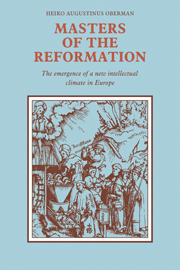Book contents
- Frontmatter
- Contents
- Preface
- Abbreviations
- Map
- PART I INTELLECTUAL RENEWAL
- 1 The ivory tower: the university as observatory
- 2 The impact of humanism: fact and fancy
- 3 The scholastic rift: a parting of the ways
- 4 The devotio moderna: movement and mystery
- 5 Patterns of thought on the eve of upheaval
- 6 The Augustine renaissance in the later Middle Ages
- PART II THE GRAPES OF WRATH
- PART III NEW JERUSALEM WITHIN THE OLD WALLS
- Student population at German universities 1385–1540
- Chronological outline
- Bibliography
- Index of names and places
- Index of modern authors
- Subject index
5 - Patterns of thought on the eve of upheaval
Published online by Cambridge University Press: 07 October 2011
- Frontmatter
- Contents
- Preface
- Abbreviations
- Map
- PART I INTELLECTUAL RENEWAL
- 1 The ivory tower: the university as observatory
- 2 The impact of humanism: fact and fancy
- 3 The scholastic rift: a parting of the ways
- 4 The devotio moderna: movement and mystery
- 5 Patterns of thought on the eve of upheaval
- 6 The Augustine renaissance in the later Middle Ages
- PART II THE GRAPES OF WRATH
- PART III NEW JERUSALEM WITHIN THE OLD WALLS
- Student population at German universities 1385–1540
- Chronological outline
- Bibliography
- Index of names and places
- Index of modern authors
- Subject index
Summary
Whateverthe influence of a historiographically harried Tübingen humanism upon the European scene, by any assessment it shaped the university's atmosphere between 1477 and 1516 in a peripheral manner at best. Elsewhere on the continent, humanism had allied itself by 1500 with two and occasionally with all three of the ‘biblical languages’, and ‘eloquence’ had long since ceased to mean mere elegance or nimble-tongued Latinity. Against this background the contemporary adulatory hymns addressed to Tubingen's provincial poeta, Heinrich Bebel, must be savoured with a grain of salt. They can best be admitted, if not as testimonium paupertatis, then as testimonium abundantiae: as witnesses to that epoch's passion for praise and praising.
On the other hand, the ‘academy of Thomas Anshelm’ flourished intermittently alongside the university only to disintegrate in the wake of Anshelm's flight to Hagenau in the summer of 1516. It is true that Christopher Scheurl, for a long time leader of the Nuremberg humanist circle, could report nearly three years later to Melanchthon in Wittenberg about a Frankfurt meeting of Melanchthon's former Tübingen colleagues and disciples. But such passing mention cannot disguise the fact that Melanchthon never managed to found a Tübingen sodality comparable to those in the university towns of Heidelberg, Erfurt or Vienna or to the sodalitas Augustana or Staupitziana in the bustling commercial centres of Augsburg and Nuremberg.
Tübingen occupies at best a modest niche in the as yet little-studied history of this fascinating preliminary form of the later scientific academies.
- Type
- Chapter
- Information
- Masters of the ReformationThe Emergence of a New Intellectual Climate in Europe, pp. 57 - 63Publisher: Cambridge University PressPrint publication year: 1981



